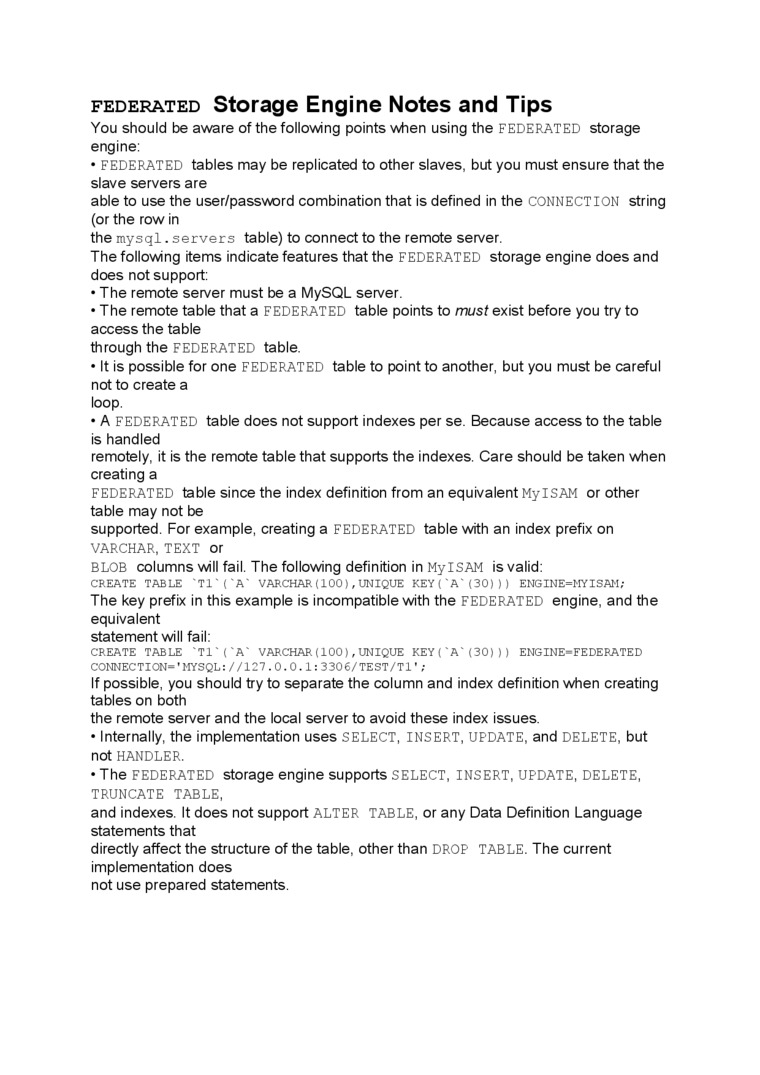89334

Federated Storage Engine Notes and Tips
You should be aware of the foliowing points when using the FEDERATED storage engine:
• FEDERATED tables may be replicated to other slaves, but you must ensure that the slave servers are
able to use the user/password combination that is defined in the CONNECTION string (or the row in
the mysql. servers table) to connect to the remote server.
The following items indicate features that the FEDERATED storage engine does and does not support:
• The remote server must be a MySQL server.
• The remote table that a FEDERATED table points to must exist before you try to access the table
through the FEDERATED table.
• It is possible for one FEDERATED table to point to another, but you must be careful not to create a
loop.
• A FEDERATED table does not support indexes per se. Because access to the table is handled
remotely, it is the remote table that supports the indexes. Care should be taken when creating a
FEDERATED table sińce the index definition from an equivalent MylSAM or other table may not be
supported. For example, creating a FEDERATED table with an index prefix on
VARCHAR, TEXT or
BLOB columns will fail. The following definition in MylSAM is valid:
CREATE TABLE 'Tl' ('A' VARCHAR(100), UNIQUE KEY('A' (30) )) ENGINE=MYISAM;
The key prefix in this example is incompatible with the FEDERATED engine, and the
equivalent
statement will fail:
CREATE TABLE 'Tl'('A' VARCHAR(100), UNIQUE KEY('A'(30))) ENGINE-FEDERATED CONNECTION-’MYSQL://127.0.0.1:3306/TEST/T1’;
If possible, you should try to separate the column and index definition when creating tables on both
the remote server and the local server to avoid these index issues.
• Internally, the implementation uses SELECT, INSERT, UPDATE, and DELETE, but not HANDLER.
• The FEDERATED storage engine supports SELECT, INSERT, UPDATE, DELETE, TRUNCATE TABLE,
and indexes. It does not support ALTER TABLE, or any Data Definition Language statements that
directly affect the structure of the table, other than DROP TABLE. The current
implementation does
not use prepared statements.
Wyszukiwarka
Podobne podstrony:
If you purchased this book withou! a covcr you should be aware thaf this book is stolen propeny. Ii
NOTĘ: If you purchased this book without a cover you should be aware rhal this book is stołen propef
5 El clima y los viajesWeather and travel By the end of this chapter you should be able to: •
BOOK SERIES u u *2<x> I Fiq. 11. Burroughs DC-106A. Labels for odd and even grid* should be
Download BIOTECNOLOGĺA AMBIENTAL PDF eBooks Free It should be centered between the left a
General Security Issues This section describes generał security issues to be aware of and what you c
The Federal Executive Council, as well as other political and State forums, were immediately warned
0611?63H0 DO YOU HAVE SOMETHING YOU SHOULD BE DOING? TAKE A NAP z Z z Z
Obrazek 52 Tipmript designed and every stone fitted into its place perfectly. Do you know that some
72574 S5004016 [ Cmns and potuer w Lau Iron Age Rruam 30 musi be madę. We should be wary of making t
Lining "Shoulder seams" Now the front and back linings can be sewn to the shirt fabric usi
policjaOVouTube°L #BanCash #Dystopia #BigBrotherGovernment Digital Currency: Why You Should Be
więcej podobnych podstron